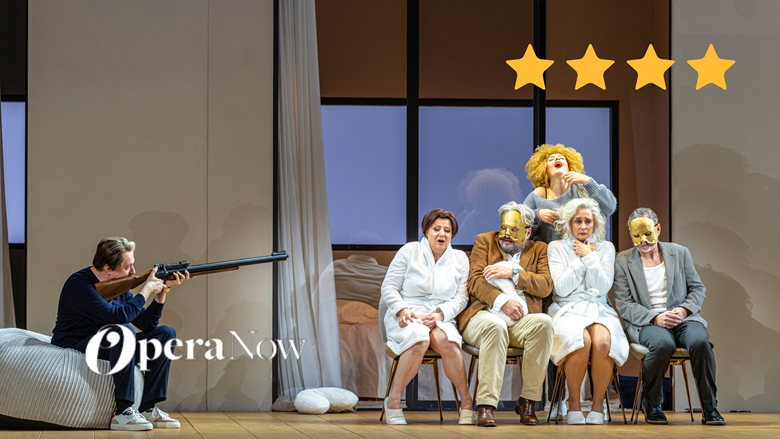Mozart: Così fan tutte at Paris’ Théâtre du Châtelet | Live Review
Colin Clarke
Thursday, February 29, 2024
Théâtre du Châtelet breathes new life into Mozart's opera

Thomas Amouroux
⭐️⭐️⭐️⭐️
Dmitri Tcherniakov is not out to please traditionalists. His Rimsky-Korsakov Tsar Saltan (Opera Now, 11/23) was a phenomenal re-imagining. Here, in Mozart’s Così, Tcherniakov gives us a tale of wife-swapping, and of a third couple above and beyond the four central characters: Don Alfonso and Despina, together from the start and seen arguing prior to the Overture. They are the hosts for the remarkable events which follow. Their relationship veers from one extreme to the other: from violence to passion in the modern, bright, minimalist apartment that forms the set for the entire opera. Two bedrooms behind glass doors (but with curtains) offer space for the lovers’ infidelities. In another spin, the couples are in their 50s/60s. The subtitle of Così is 'La scuola degli amanti' (The School for Lovers); Tcherniakov suggests that even after a long marriage, there are new lessons perhaps learned in non-conventional ways.

 The cast of Così fan tutte | Photo: Thomas Amouroux
The cast of Così fan tutte | Photo: Thomas Amouroux
All of this is shown under a microscope: Gleb Filshtinsky’s lighting is unrelentingly bright; this is less a school for lovers, more of a Petri dish. The set itself is a box that literally frames the action. As if to emphasise the claustrophobic nature of the space, we only see the chorus – the excellent Chœur Stella Maris - at the final bows: they are off-stage otherwise.
Agneta Eichenholz’s Fiordiligi, pure yet strong, agile yet nuanced.
Inevitably, some of the more period-specific elements of the plot were lost: the 'Doctor's magnet', a reference to Mesmer, for example (instead, the characters shook). The ‘disguises’ are symbolic (Venetian masks, sometimes removed while still in ‘disguise’; a knowing pretence, not covert swapping). At the signing of the contract, Alfonso uses a gun to force change. And for all Tcherniakov’s changes, the focus remains on interpersonal relationships.
Two stars shone brightest on the night of February 8: the phenomenal tenor Rainer Trost as Fernando (an ‘Un’ aura amorosa’ like few others, an exposition of strain-less beauty); while the madcap acting of the Despina, Patricia Petibon, was in itself a masterclass, owning the stage with the perfect blend of voice and drama.
Georg Nigl, (Papageno in Rousset’s Gstaad Zauberflöte, 2022), was one of the finest of Don Alfonsos, delighting in the mayhem. Another triumph was Agneta Eichenholz’s Fiordiligi, pure yet strong, agile yet nuanced.
The Guglielmo of Russell Braun and the Dorabella of Claudia Mahnke were the only slight disappointments, Braun sometimes submerged beneath the orchestra, Mahnke’s vibrato occasionally distracting.
What a delight it is to hear Rousset in standard repertoire: he completely understands Così’s trajectory, and with Les Talens Lyriques, the result was deeply satisfying. The brisk Overture certainly set the scene for a generally fast but never forced account; and when the music expands, Rousset allowed the perfect space. Having his crack band of instrumentalists at his disposal played huge dividends, not least in the horn obbligato of Fiordiligi's 'Per pietà' (Jeroen Billiet and Yannick Maillet splendid on natural horns, the range of colour miraculous). Strings were impeccably together; solos from flute (Jocelyn Daubigney), oboe (Patrick Beaugiraud) and clarinet (Théo Couillez) shone with character. A memorable evening.
Tcherniakov’s staging will divide, but it is certainly thought-provoking; and Rousset’s take reminds us of his stature in core repertoire (he moves on to Cimarosa and Salieri in Vienna next ...).






